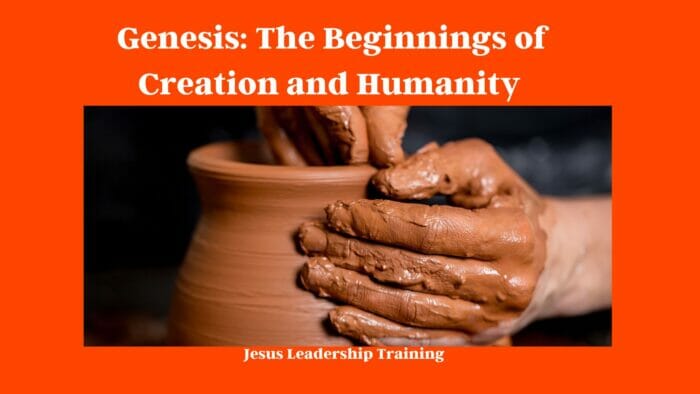Table of Contents
Meta Description:
Well, here’s the long and short of it, folks. The Book of Genesis, the very first book in the Holy Bible, has been, for millennia, a profound narrative source for the origins of the world and humanity. It’s an epic and momentous story, one that has captivated and provoked thought in millions of minds. This article delves into the heart of “Genesis: The Beginnings of Creation and Humanity”, an exploration that promises to be as enlightening as it is engaging.
Genesis: The Beginnings of Creation and Humanity
The Book of Genesis, a narrative that’s been told and retold, interpreted, and reinterpreted, begins with one of the most famous lines in literary history – “In the beginning, God created the heavens and the earth”. A powerful statement that paves the way for a tale of cosmic creation and humanity’s first steps. The fascinating thing about Genesis is how it wrestles with complex questions about the nature of existence, the human condition, and the interplay between the divine and mortal realms.
Genesis 1: The Dawn of Creation
In the first chapter, Genesis outlines a seven-day blueprint for the creation of the universe. It starts with a canvas of “formless void”, moving on to the creation of light, the earth and heavens, plants, animals, and finally, the pinnacle of creation – humanity. Each day’s work reinforces the concept of a carefully planned and purposeful universe.

Humanity’s First Steps: Adam and Eve
Genesis 2 pivots from the broad strokes of cosmic creation to a more intimate portrayal of human beginnings – the creation of Adam and Eve. This account is a foundational narrative in many cultures, often seen as a reflection of humanity’s relationship with nature and the divine.
The Garden of Eden: Paradise Lost
Paradise, as they say, never lasts, does it? The story swiftly moves into the fall of Adam and Eve from their idyllic Garden of Eden, a poignant tale that examines disobedience, free will, and the consequences of our actions.
Genesis: A Tapestry of Narratives
Genesis isn’t just a single story; it’s a tapestry woven with numerous narratives, each with its unique characters and events. The tale of Noah’s Ark, the story of Babel, the life of Abraham, and the saga of Joseph are all part of this incredible narrative fabric.
Noah and the Flood: A Fresh Start
Genesis gives us the tale of Noah, his Ark, and the Great Flood, a narrative that emphasizes the theme of divine judgement, salvation, and the cyclical nature of life and new beginnings.

Babel: The Divided Humanity
The Tower of Babel is another compelling tale, which explores the origin of language diversity and the consequences of human hubris and ambition.
The Chronicles of Abraham: A Covenant with God
The narrative of Abraham, God’s chosen one, and his descendants forms a significant portion of Genesis. It explores the themes of faith, sacrifice, and the promises of God.
The Trials and Triumphs of Joseph
The Genesis narrative concludes with the gripping tale of Joseph, his trials, and eventual rise to power in Egypt. It’s a story of perseverance, providence, and redemption.
The Genesis Impact: The Lasting Legacy
The echoes of Genesis continue to reverberate in our collective consciousness, influencing cultures, inspiring art, and guiding ethical debates. It provides a lens to understand the human condition, moral questions, and our place in the universe.

Genesis and Cultural Imprint
Genesis has left an indelible mark on various art forms, literature, music, and even pop culture, reflecting its profound and universal themes.
The Genesis Interpretations: From Literal to Allegorical
Interpretations of Genesis range from a literal reading to allegorical understanding. It’s like peeling back the layers of an onion – each interpretation adds depth and nuance to the overall narrative.
The Scientific Viewpoint: Genesis and The Big Bang
Modern science and the narrative of Genesis seem to intersect in fascinating ways, particularly when comparing the Genesis creation story with the Big Bang Theory. Though not perfectly aligned, the echoes are certainly intriguing.
Conclusion
Genesis: The Beginnings of Creation and Humanity is more than just an ancient narrative; it’s a canvas that paints grand cosmic dramas and intimate human sagas. It’s a story that explores life’s biggest questions and invites us to reflect on our place in the grand scheme of things. In short, it’s a narrative journey that is as profound as it is enlightening.
Frequently Asked Questions
1. What does Genesis mean? Genesis means ‘origin’ or ‘beginning’, fitting for a book that explores the origins of the universe and humanity.
2. How does Genesis describe the creation of the universe? Genesis describes a seven-day creation process, where God creates everything from light, the earth and heavens, to plants, animals, and finally, humanity.
3. What is the significance of the story of Adam and Eve? The story of Adam and Eve represents the beginnings of human life, morality, and the consequences of actions.
4. What is the meaning behind the story of the Tower of Babel? The story of the Tower of Babel is often seen as a commentary on human ambition, hubris, and the diversity of languages.
5. What themes does the Book of Genesis explore? Genesis explores various themes, including the origin of life, morality, faith, obedience, human nature, divine judgement, and the promise of redemption.
6. How does modern science relate to the Genesis narrative? While not a perfect match, some parallels can be drawn between the Genesis creation narrative and modern scientific theories like the Big Bang.



